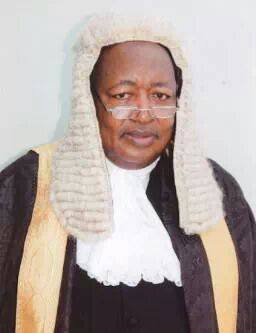
In The Shadows Of His Forebears: Tribute to Yahaya Mahmood (SAN)
LEADERSHIP Newspaper, page 35
By
Ibraheem A. Waziri
iawaziri@yahoo.com
After extolling his virtues and kind prayers, newspapers that carried the reports of his death, mentioned he was born in Kachia Local Government in the southern part of Kaduna State. While this is true it nevertheless, raises a question of proper record, in this era of geographical consciousness. In that, I would have preferred the reports saying, he was born in Kachia by a parent from Kakaki province, Zaria, Alkali Mahmood Muhammad, who was at Kachia then as a Shari’a Court judge.
A tribute to Yahaya Mahmood is a tribute to his grandparents, who shone the lights centuries back that inspired his excellence. Al imtihanu tha’abun wa indal mahmudu sahlun, “ Exams is tough but to Mahmood it is soft and easy”, is a popular verse that is said to have been created by an Arab invigilator in praise of Alkali Mahmood, Yahaya’s father, while among the pioneering students of the old School for Arabic Studies, Kano.
Mahmood was tagged by some, as the successor of the scholarly tradition of his family, symbolised by his elder brother, Ma’ajin Zazzau Mal. Ishaq Muhammad. Ma’aji was a mentor to the Waziri of Sokoto Junaidu and the late Lamido of Adamawa, Aliyu Mustapha. Prof. Shehu Galadanci, in a Phd thesis, Harakatul Luggah, celebrated Ma’aji and carried a number of poems written by scholars in his praise.
In the early 1930s the colonial masters wanted to have a thorough appreciation of the Sokoto Caliphate in its social values and legal philosophy. The highest book of Maliki jurisprudence on which these were pinned was Mukhtasar, by a 14th century Egyptian scholar, Khalil Ibn Ishaq al Jundi. The then Sarkin Zazzau Ibrahim Dan Kwasau sent Wazirin Zazzau (who was Alkalin Zazzau then), to Lagos for a gathering of all scholars from the old Caliphate to debate the book. Since then it became a standard till early 1980s that a scholar excelling in the area of Muslim jurisprudence, in the traditional learning centres (Makarantun zaure) was justified only in comparison to Wazirin Zazzau Malam Umaru Muhammadu, whose fame and display of expertise were proven during that gathering. Waziri was an elder brother and a mentor to Ma’aji.
Dr. Aliyu Abubakar in a Phd thesis for Azhar University Egypt, Sakafatul Islama Fiy Najeriya (Arab Civilisation in Nigeria), which considered the period between 1750 to 1960, discussed the rich intellectual history of Northern Nigeria, and the family of Yahya Mahmood featured in, by the author’s admission, as the most consolidated in discipline according to the old intellectual tradition. Prior to the fame of Waziri Malam Umaru was that of Waziri’s elder brother and his mentor, Mal. Ibrahim Khalil Muhammad who was praised by many among his students as an equal or a replacement of Khalil the author of Mukhtasar.
The founding of this intellectual centre is attributed to the uncle of Alkali Mahmood, Mal. Iyal Ibrahim, who was the sole mentor of Emir of Zazzau Muhammadu Lawal Kwasau that the British deposed in the year 1903. It was Sarki Muhammadu Lawal Kwasau that rewarded Mal. Iyal Ibrahim with the title of Salanken Zazzau, the supreme palace judge, thereby marking the beginning of the family’s ascent in public jurisprudence.
The family dominated this for periods of about a century, from Alkalin Zazzau Mal. Yakubu Muhammad, Alkalin Zazzau (later Wazirin Zazzau) Mal. Umaru Muhammadu, to their cousin, Alkalin Zazzau Mal. Sulaiman Siddiq. Save for an interlude where another erudite scholar from Unguwan Juma, Zaria, Alkalin Zazzau Muhammad Lawal held the post.
The battle for the soul of Kaduna State judiciary was to be fought much later between the two families. Barrister Yahya Mahmood in newspaper articles written in the 1980s complained of discrimination in Kaduna State judiciary which was at a time headed by Justice Shehu Muhammad, a son to Alkalin Zazzau Muhammad Lawal. It was that which led him to leaving the service later.
When I mentioned it to him few months ago in the light of the suggestions of an autobiography that we should co-author, he narrated the incidents and events afresh with visibly expressed pains. He then said the parties involved in the two families have for long forgiven each other and were in the best mode of relationship.
As fate would have it, we couldn’t hold the meeting to finalise the issues on the autobiography which I believe would have fairly served his extended family, our culture and the entire nation, that is still struggling in crisis of conscience and quest for established philosophical direction.
Yahaya Mahmood held Sultan of Sokoto Ibrahim Dasuki in high esteem. He attributed his many successes to the help of the latter. In one of our sessions together he mentioned how the Sultan and the governor of Sokoto state, Aliyu Magatakarda Wammako facilitated his appointment as the council Chairman of the Federal University of Technology, Akure.
May the soul of Yahya Mahmood rest in perfect peace alongside his parents and grandparents who in their resolutions and choices we found ourselves adequately equipped to live our times and realities in the best of vogues.


Recent Comments